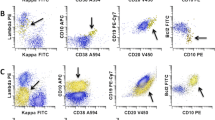Background:
Background:
Although Helicobacter pylori eradication is effective in treating low-grade gastric mucosa-associated lymphoid tissue (MALT) lymphoma, the condition in some patients deteriorates even after the eradication. Therefore, it is important to predict the disease outcome before starting H. pylori eradication. We investigated the usefulness of flow cytometry, quantifying CD19- and CD20-positive B lymphocytes in MALT lymphoma tissue, for predicting the disease outcome after H. pylori eradication.
Methods:
Tissue specimens from 14 patients with H. pylori-positive low-grade gastric MALT lymphoma were examined by histology, Southern blotting, and flow cytometry before therapy. Serum levels of soluble interleukin (IL)-2 receptor were also measured. The relationship between the data and the prognosis after H. pylori eradication was analyzed.
Results:
Remission occurred in 10 of the 14 patients. The condition in the 4 remaining patients deteriorated even after H. pylori eradication. The percentages of CD19- and CD20-positive cells in MALT lymphoma tissue from the patients in remission were both significantly lower than those in the tissue from patients not in remission. Indeed, 4 of the 5 patients in whom both CD19- and CD20-positive cells accounted for more than 50% of the total number of lymphocytes had gastrectomy, whereas all patients in whom both CD19- and CD20-positive cells accounted for less than 50% of the total number of lymphocytes achieved remission. Although immunoglobulin gene rearrangement was present in all patients operated on, there were also 6 patients whose MALT lymphoma was ameliorated in spite of the presence of gene rearrangement. The serum level of soluble IL-2 receptor was in the normal range in all patients tested.
Conclusions:
Analysis of mature B-cell markers in MALT lymphoma tissue is more useful than the examination of immunoglobulin gene rearrangement or serum levels of soluble IL-2 receptor in predicting the outcome of low-grade gastric MALT lymphoma after H. pylori eradication.
Similar content being viewed by others
Author information
Authors and Affiliations
Additional information
Received: January 5, 2001 / Accepted: November 2, 2001
Rights and permissions
About this article
Cite this article
Matsushima, Y., Kinoshita, Y., Fukui, H. et al. Immunological and molecular analysis of B lymphocytes in low-grade MALT lymphoma of the stomach. Are there any useful markers for predicting outcome after Helicobacter pylori eradication?. J Gastroenterol 37, 428–433 (2002). https://doi.org/10.1007/s005350200062
Issue Date:
DOI: https://doi.org/10.1007/s005350200062




